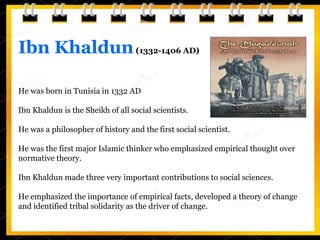
Ibn khaldun (Father of sociology)
- 1. Ibn Khaldun(1332-1406 AD) He was born in Tunisia in 1332 AD Ibn Khaldun is the Sheikh of all social scientists. He was a philosopher of history and the first social scientist. He was the first major Islamic thinker who emphasized empirical thought over normative theory. Ibn Khaldun made three very important contributions to social sciences. He emphasized the importance of empirical facts, developed a theory of change and identified tribal solidarity as the driver of change.
- 2. Muqaddimah He is best known for his Muqa-ddimah (known as Prolegomenon in English), which was discovered, evaluated and fully appreciated first by 19th century European scholarship Western scholars recognized him as one of the greatest philosophers to come out of the Muslim world. He sought to write a world history preambled by a first volume aimed at an analysis of historical events. Muqaddimah was based on Ibn Khaldun's unique approach and original contribution and became a masterpiece in literature on philosophy of history and sociology. The chief concern of this monumental work was to identify psychological, economic, environmental and social facts that contribute to the advancement of human civilization and the currents of history. In this context, he analysed the dynamics of group relationships and showed how group-feelings, al-'Asabiyya, give rise to the ascent of a new civilisation and political power and how, later on, its diffusion into a more general civilization invites the advent of a still new 'Asabiyya in its pristine form.
- 3. He identified an almost rhythmic repetition of rise and fall in human civilization, and analysed factors contributing to it. His contribution to history is marked by the fact that, unlike most earlier writers interpreting history largely in a political context, he emphasised environmental, sociological, psychological and economic factors governing the apparent events. This revolutionised the science of history and also laid the foundation of Umraniyat (Sociology). The other volumes of his world history Kitab al-I'bar deal with the history of Arabs, contemporary Muslim rulers, contemporary European rulers, ancient history of Arabs, Jews, Greeks, Romans, Persians, etc., Islamic History, Egyptian history and North-African history, especially that of Berbers and tribes living in the adjoining areas.
- 4. Concept of Asabiyya: Asabiyya or asabiyah means social solidarity, social integration, and social cohesion. It is the force which unites people with one another. However, their patterns of behavior brought them closer. Asabiyya was important for economic, intellectual and political development of society. According to Ibn-e-Khaldoon the tribes are successful because they have highest Asabiyya. He also explains that the more the tribes deviate from Asabiyya, the more is the element of deviance; religious movements sharpen the force of Asabiyya and no movement can succeed without it. Ibn e Khaldoon was of the view that man is an animal, but he becomes human with the cooperation of all social elements that become a source of satisfaction of needs.
- 5. Ibn- Khaldoon's methodology: In Muqaddima, he explained the method of logic and science. He gave his research based on the findings that there is a close relationship between history, political and social events, and they work on the basis of cause and effect relationship. Theory of rural and urban society: He described some characters of human societies over the animal societies and the need of supreme governor for them. His terms for rural and urban society were “Badank” and “Harda” respectively. They had strong Asabiya. Society as living organism: Society is like a living organism and organisms consist of body parts. Society is composed of culture and people. Both can get sick, can grow, both can die and both feel pain when one part gets hurt. Social change: The societies that loose Asabiyya are bound to undergo changes. This change is a cyclic process in which there are fixed stages. Each stage takes 40 years and total 120 years. Each stage has its own demographic, economic, religious and political characteristics based on growth, development and decay.
- 6. Father of sociology: Ibn e Khaldoon’s findings and reseach on social changes, concept of asabiya and Muqaddima, gave him the status of father of sociology. He coined the term Umraniya and introduced the scientific method of study. The last volume deals largely with the events of his own life and is known as Al-Tasrif. This was also written in a scientific manner and initiated a new analytical tradition in the art of writing autobiography. Ibn Khaldun's influence on the subject of history, philosophy of history, sociology, political science and education has remained paramount ever since his life. His books have been translated into many languages, both in the East and the West, and have inspired subsequent development of these sciences. For instance, Prof. Gum Ploughs and Kolosio consider Muqaddimah as superior in scholarship to Machiavelli's The Prince written a century later, as the forrner bases the diagnosis more on cultural, sociological, economic and psychological factors.
- 7. Father of sociology: Ibn e Khaldoon’s findings and reseach on social changes, concept of asabiya and Muqaddima, gave him the status of father of sociology. He coined the term Umraniya and introduced the scientific method of study. The last volume deals largely with the events of his own life and is known as Al-Tasrif. This was also written in a scientific manner and initiated a new analytical tradition in the art of writing autobiography. Ibn Khaldun's influence on the subject of history, philosophy of history, sociology, political science and education has remained paramount ever since his life. His books have been translated into many languages, both in the East and the West, and have inspired subsequent development of these sciences. For instance, Prof. Gum Ploughs and Kolosio consider Muqaddimah as superior in scholarship to Machiavelli's The Prince written a century later, as the forrner bases the diagnosis more on cultural, sociological, economic and psychological factors.